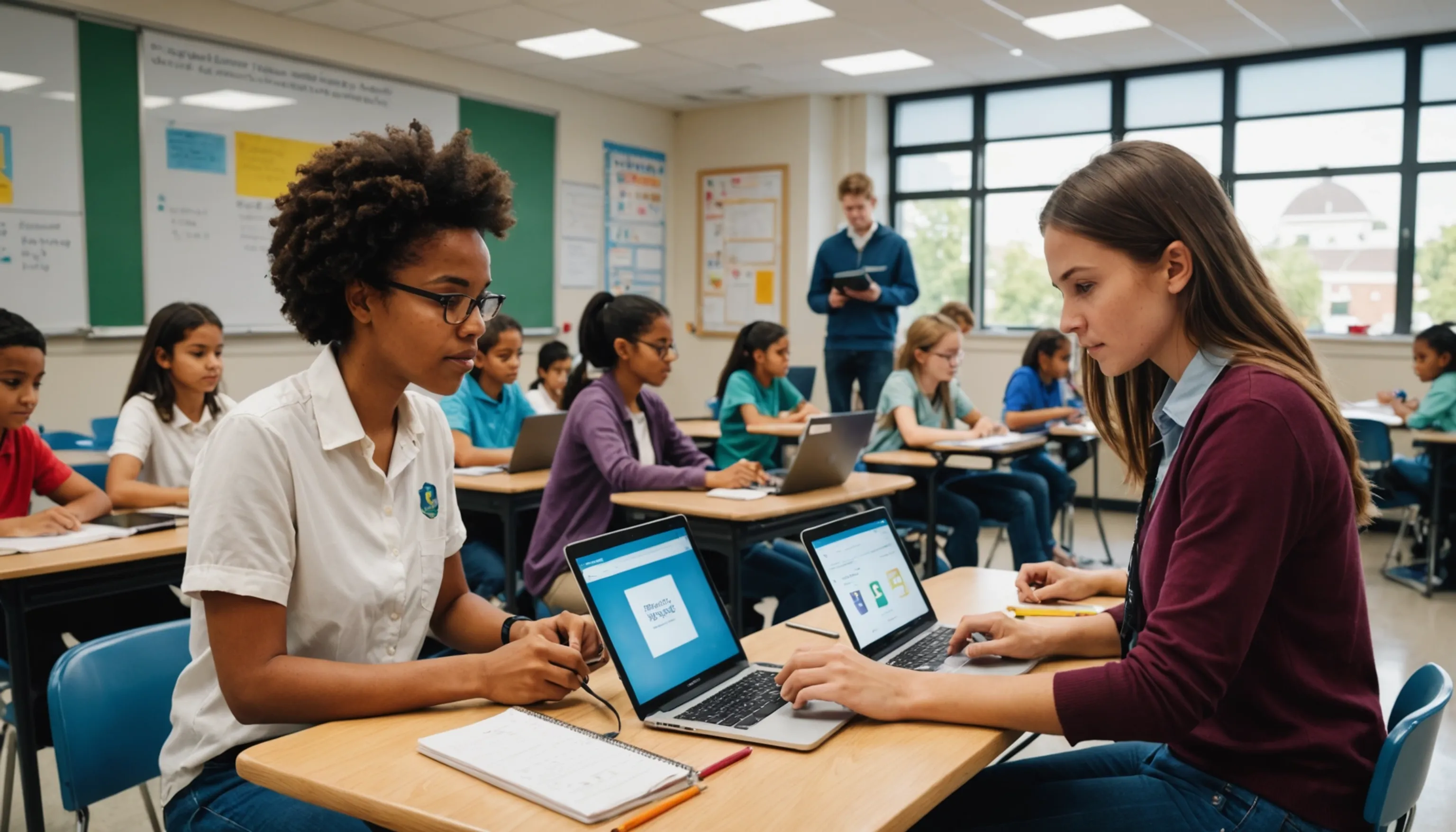Americans Spend Record Amounts on Tutoring
 HvWHenry van Wagenberg
HvWHenry van Wagenberg
Americans Spend Records on Tutoring: An Overview
In recent years, Americans have been spending record amounts on tutoring, reflecting a growing recognition of its importance in education. With the demand for academic support skyrocketing, parents are increasingly investing in personalized assistance for their children. This surge in spending can be attributed to various factors, including heightened competition for college admissions and a desire for academic excellence.
According to a report by the National Center for Education Statistics, tutoring expenditures have reached an all-time high, indicating that families view tutoring as a vital resource for their children's success.
Why Are Tutoring Expenses Rising?
The rising expenses associated with tutoring can be attributed to several key factors that reflect changes in the educational landscape. Firstly, there has been a significant increase in academic competition. As college admissions become more competitive, parents are seeking additional support to give their children an edge. They believe that tutoring can help improve grades and standardized test scores, making their children more attractive candidates for top universities.
Secondly, the impact of the COVID-19 pandemic has led to a surge in demand for tutoring services. Many students experienced disruptions in their education due to remote learning, and parents are now investing in tutoring to fill learning gaps that have emerged. A study by the Wall Street Journal indicated that the demand for tutors has increased by over 30% since the pandemic began, as families recognize the need for personalized assistance.
Additionally, changing educational standards and expectations play a role in rising tutoring costs. Schools are implementing more rigorous curricula, and parents feel the need to supplement their children's education to meet these new demands. The growth of online tutoring platforms has also contributed to the increase in costs, as they often charge premium rates for specialized services.
Ultimately, the combination of heightened competition, the pandemic's effects, and evolving educational requirements has led to a significant rise in tutoring expenses across the nation.
The Impact of COVID-19 on Tutoring Demand
The COVID-19 pandemic has dramatically reshaped the landscape of education, resulting in a surge in demand for tutoring services. As schools transitioned to remote learning, many students faced challenges in adapting to this new format. Reports indicate that over 60% of parents noticed a decline in their child's academic performance during this period, leading to heightened concerns about educational gaps.
With in-person classes disrupted, parents turned to tutoring as a means to ensure their children continued to receive quality education. A survey conducted by Education Week revealed that 40% of families sought additional academic support during the pandemic, highlighting the urgent need for personalized learning experiences.
Moreover, the shift to online learning created a demand for tutors who could provide tailored instruction in a virtual environment. Many families discovered the flexibility and convenience of online tutoring, which allowed students to engage with knowledgeable instructors from the comfort of their homes. This accessibility contributed to the growth of various online tutoring platforms, making it easier for parents to find qualified tutors.
Additionally, as schools began to reopen, parents remained concerned about potential learning loss. Many opted for tutoring as a proactive measure to help their children catch up and solidify their understanding of key concepts. This trend demonstrates that the pandemic has not only changed how education is delivered but has also underscored the critical role of tutoring in supporting student success.

Changing Educational Standards and Expectations
In recent years, educational standards and expectations have undergone significant changes, impacting the way students are taught and evaluated. The implementation of more rigorous curricula, such as the Common Core State Standards, has raised the bar for academic achievement. These new standards aim to ensure that students are better prepared for college and careers, emphasizing critical thinking, problem-solving, and real-world applications.
As a result, parents have become increasingly aware of the challenges their children face in meeting these heightened expectations. Many are turning to tutoring as a way to provide additional support and resources that align with these new standards. A study by the National Center for Education Statistics revealed that nearly 30% of parents believe tutoring is essential for helping their children grasp complex subjects introduced by these updated curricula.
Moreover, the shift towards standardized testing has intensified the pressure on students to perform well academically. High-stakes tests often determine college admissions and scholarship opportunities, prompting parents to seek out tutoring services to enhance their children's test-taking skills and overall performance. This has led to a growing market for specialized tutoring programs focused on test preparation.
Additionally, the rise of technology in education has changed how students learn. With the integration of digital tools and resources, parents recognize the need for tutors who can guide their children in navigating these new educational landscapes. Consequently, the changing educational standards have fueled a demand for tutoring services that cater to evolving academic needs.
The Benefits of Investing in Tutoring
Investing in tutoring offers numerous benefits for students and their families. Firstly, it can lead to improved academic performance, as personalized instruction helps address individual learning gaps. Students often experience enhanced confidence and motivation, knowing they have support tailored to their needs. Additionally, tutoring provides personalized learning experiences, allowing students to learn at their own pace and style. This targeted approach can foster a deeper understanding of subject matter, making it easier for students to excel. Ultimately, the investment in tutoring not only contributes to better grades but also prepares students for future academic challenges.
Improved Academic Performance
One of the most significant benefits of investing in tutoring is the potential for improved academic performance. Personalized tutoring sessions are designed to cater to the unique needs of each student, allowing them to grasp complex concepts at their own pace. This tailored approach not only helps students master specific subjects but also reinforces their overall understanding of the material.
Research has consistently shown that students who engage in tutoring often see measurable improvements in their grades. A study published by the National Bureau of Economic Research found that students receiving tutoring scored an average of 15% higher on assessments compared to their peers who did not receive additional support.
Tutoring also provides students with the opportunity to focus on areas where they struggle. Whether it's math, reading, or science, tutors can identify specific weaknesses and develop targeted strategies to address them. This focused attention can lead to a dramatic turnaround in a student's academic performance.
Moreover, the one-on-one interaction between tutors and students fosters a supportive learning environment. Students often feel more comfortable asking questions and expressing their uncertainties, leading to deeper engagement with the material. This increased engagement can result in a more profound understanding and retention of knowledge, translating into better grades and academic outcomes.
Ultimately, the investment in tutoring not only enhances academic performance but also builds a foundation for lifelong learning, helping students develop essential skills they can carry into their future educational endeavors.

Enhanced Confidence and Motivation
Investing in tutoring can lead to enhanced confidence and motivation in students, which are crucial components of academic success. When students receive personalized support, they often experience a boost in self-esteem as they begin to grasp challenging concepts. Here are several ways tutoring fosters confidence and motivation:
- Personalized Attention: Tutors provide focused, one-on-one instruction, allowing students to ask questions and receive immediate feedback. This supportive environment helps students feel valued and understood.
- Mastery of Concepts: As students work through difficult material at their own pace, they gain a sense of accomplishment when they master new skills. This sense of achievement fuels their desire to learn more.
- Positive Reinforcement: Tutors often use positive reinforcement techniques, celebrating small successes along the way. These affirmations encourage students to keep pushing forward.
- Goal Setting: Tutors can help students set realistic academic goals, providing a clear roadmap for progress. Achieving these goals can significantly boost a student’s motivation.
Furthermore, as students become more confident in their abilities, they are more likely to participate actively in class and seek out additional learning opportunities. This positive feedback loop creates a culture of growth, where students are driven to succeed.
Overall, enhanced confidence and motivation through tutoring not only improve academic performance but also foster a lifelong love for learning, preparing students for future challenges.
Personalized Learning Experiences
One of the standout benefits of tutoring is the ability to provide personalized learning experiences. Unlike traditional classroom settings, where teachers must cater to a diverse group of students, tutoring allows for a tailored approach that aligns with the individual needs of each learner. Here are several ways personalized learning enhances the educational experience:
- Customized Curriculum: Tutors can adapt lessons based on a student's current understanding, interests, and learning style. This customization ensures that students engage with material that resonates with them, making learning more enjoyable.
- Flexible Pacing: Every student learns at their own speed. With tutoring, students can take the time they need to master a concept before moving on, preventing gaps in their understanding.
- Targeted Skill Development: Tutors can focus on specific areas of need, whether it’s improving math skills, enhancing reading comprehension, or preparing for standardized tests. This targeted approach helps students build confidence in their abilities.
- Real-Time Feedback: Tutors provide immediate feedback, allowing students to understand their mistakes and correct them on the spot. This instant response helps solidify learning and encourages students to take ownership of their progress.
Moreover, personalized learning experiences foster a deeper connection between tutors and students. This relationship encourages open communication, where students feel comfortable expressing their struggles and successes. Ultimately, personalized tutoring not only boosts academic performance but also nurtures a love for learning that lasts a lifetime.
How to Choose the Right Tutor
Choosing the right tutor is essential for maximizing your child's learning experience. Here are some key factors to consider:
- Identify Needs: Assess your child’s strengths and weaknesses to find a tutor who specializes in the relevant subjects.
- Check Qualifications: Look for tutors with relevant experience, certifications, or degrees in education or the subject area.
- Consider Teaching Style: Ensure the tutor's teaching approach aligns with your child’s learning style for a more effective experience.
- Read Reviews: Seek feedback from other parents to gauge the tutor's effectiveness and reliability.
Ultimately, the right fit can significantly impact your child’s academic success.
Identifying Your Child's Needs
Identifying your child's needs is a crucial first step in selecting the right tutor. Understanding their unique learning requirements can help ensure that they receive the support necessary for academic success. Here are some strategies to effectively identify those needs:
- Assess Academic Performance: Begin by reviewing your child's grades and report cards. Look for subjects where they struggle or show inconsistent performance. This data can provide insight into areas requiring additional support.
- Observe Learning Styles: Pay attention to how your child learns best. Some children thrive in visual learning environments, while others may benefit more from auditory or hands-on approaches. Understanding their preferred learning style can help in finding a tutor who aligns with that method.
- Communicate with Your Child: Engage your child in a conversation about their academic experiences. Ask questions about subjects they find challenging or enjoyable. Their feedback is invaluable in pinpointing specific areas where they may need help.
- Consult Teachers: Speak with your child's teachers for professional insights. They can offer information about your child's strengths and weaknesses, as well as recommendations for improvement.
By taking the time to identify your child's needs, you can select a tutor who is well-suited to address those specific challenges. This tailored approach not only enhances the effectiveness of tutoring but also helps to foster a positive attitude toward learning.
Qualities to Look for in a Tutor
When searching for the right tutor for your child, it's essential to consider several key qualities that can significantly impact the tutoring experience. Here are some important attributes to look for:
- Experience and Qualifications: A good tutor should have relevant experience and a solid educational background in the subject they are teaching. Look for tutors who have credentials, certifications, or degrees that demonstrate their expertise.
- Effective Communication Skills: A tutor must be able to explain complex concepts in a way that is easy for your child to understand. They should also listen actively to your child’s questions and concerns, fostering an open line of communication.
- Patience and Empathy: Every student learns at their own pace. A quality tutor should exhibit patience and empathy, understanding that some concepts may take time to grasp. They should encourage and motivate your child, helping them build confidence.
- Adaptability: The ability to adjust teaching methods based on your child’s learning style and pace is crucial. A great tutor should be flexible and willing to modify their approach to meet your child's unique needs.
- Passion for Teaching: A tutor who is genuinely passionate about teaching and helping students succeed can inspire your child and make learning more engaging.
By considering these qualities when selecting a tutor, you can help ensure that your child receives the best possible support for their academic journey.
Different Types of Tutoring Options
When it comes to tutoring, there are various options available to suit the diverse needs of students. Understanding the different types of tutoring can help you make an informed decision based on your child's requirements and learning style. Here are some common types of tutoring options:
- One-on-One Tutoring: This traditional approach involves a tutor working individually with a student. It allows for personalized attention and a tailored learning experience, enabling the tutor to focus on the student's specific strengths and weaknesses.
- Group Tutoring: In this setting, a tutor instructs a small group of students. Group tutoring can foster collaboration and discussion among peers, making it a great option for subjects that benefit from interaction, such as language learning.
- Online Tutoring: With the rise of technology, online tutoring has become increasingly popular. Students can connect with tutors via video calls, allowing for flexibility and access to a wider range of qualified tutors, regardless of location.
- In-Home Tutoring: Some families prefer tutors to come to their home for convenience. In-home tutoring creates a comfortable learning environment and allows students to learn in familiar surroundings.
- Specialized Tutoring: This type of tutoring focuses on specific subjects, skills, or learning challenges, such as test preparation, special education needs, or advanced topics. Specialized tutors often have expertise in particular areas.
By exploring these different tutoring options, you can choose the best fit for your child's educational journey and ensure they receive the support they need to succeed.
